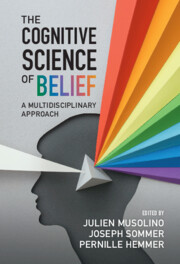Book contents
- The Cognitive Science of Belief
- The Cognitive Science of Belief
- Copyright page
- Contents
- Figures and Tables
- Contributors
- Chapter 1 Introduction
- Part I Understanding Belief
- Part II Domains of Beliefs
- Part III Variation in Beliefs
- Pathological Beliefs
- Individual Differences in Beliefs
- Environmental Effects on Beliefs
- Chapter 23 Belief in Human Rights: An Opportunity for Cross-Cultural Cognitive Science
- Chapter 24 The Belief–Action Gap in Environmental Psychology: How Wide? How Irrational?
- Toward Better Beliefs
- Index
- References
Chapter 24 - The Belief–Action Gap in Environmental Psychology: How Wide? How Irrational?
from Environmental Effects on Beliefs
Published online by Cambridge University Press: 03 November 2022
- The Cognitive Science of Belief
- The Cognitive Science of Belief
- Copyright page
- Contents
- Figures and Tables
- Contributors
- Chapter 1 Introduction
- Part I Understanding Belief
- Part II Domains of Beliefs
- Part III Variation in Beliefs
- Pathological Beliefs
- Individual Differences in Beliefs
- Environmental Effects on Beliefs
- Chapter 23 Belief in Human Rights: An Opportunity for Cross-Cultural Cognitive Science
- Chapter 24 The Belief–Action Gap in Environmental Psychology: How Wide? How Irrational?
- Toward Better Beliefs
- Index
- References
Summary
The belief–action gap was originally conceptualized by psychologists who aimed to ground behaviour in beliefs but found that their models had little predictive value. The recurrent use of this concept often comes with the assumption that human behaviour is somewhat irrational or weirdly misaligned with their beliefs. This gap is particularly striking in the environmental domain, where many people seemingly think one way but act another. In this chapter, we review a number of factors that hinder general beliefs from translating into actual behaviors. We emphasize the existence of measurement issues, information deficits about the exact impact of one’s actions, structural factors, and psychological factors that together impact the robustness of the association between beliefs and actions. In particular, socio-cognitive factors have a massive impact on people’s decisions to act in ways that are aligned with their deep-seated beliefs. Once all these factors are properly taken into account, it becomes clear that the belief–action gap is not a token of human irrationality but should in fact be expected.
Keywords
- Type
- Chapter
- Information
- The Cognitive Science of BeliefA Multidisciplinary Approach, pp. 536 - 554Publisher: Cambridge University PressPrint publication year: 2022
References
- 1
- Cited by

